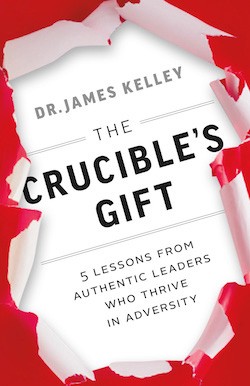In writing the book The Crucible’s Gift: 5 lessons from authentic leaders who thrive in adversity, the most common question I receive is, “does a leader have to have a crucible?” My first response is always no, but…… Additionally, I get comments that follow the logic of, “I have never had a crucible, but I am a good leader.” Taking these two strings of thoughts, it led me to try and answer the question, ‘does a leader need a crucible?’
What I concluded across the 140 plus interviews is that some sort of crucible is necessary for a leader to be more authentic. I am sure there will be those who read this who will say I don’t know what I’m talking about and that it’s not necessary to have a crucible to be authentic. I would expect some readers to say to themselves, “You know, I haven’t had a crucible.” Well, we all have crucibles. It is just their type and significance that vary, sometimes drastically, as does our ability to reflect on them. It is the reflection that many miss.
Not to be condescending or dismissive, here is the point: a person’s crucible is unique and individual to them, and I am by no means the person to judge what you define as a crucible. All I can do is explain what I found through interviewing a wide-ranging set of leaders. For example, there were CEOs, founders and leaders I interviewed who (at least during the interview) stated that they never really went through any major type of crucible. During these interviews, I asked questions that were designed to encourage my guests to reflect on their journey. It was just that their answers didn’t appear to be very reflective. I could be off with this, and yes, many leaders could just be private individuals — totally possible. However, it seemed to me that my interactions with leaders who denied having a major crucible were at odds with my interactions with leaders who were private but acknowledged a crucible. For example, leaders who were private would either avoid a sensitive topic or state that they didn’t want to talk about a particular topic. Meanwhile, leaders who failed to acknowledge a significant professional or private crucible didn’t avoid my questions and in fact were engaged in any number of issues, but when asked to reflect on their statements, their responses were not thoughtful. Based on these experiences, I came to a simple equation:
Crucible = Authentic Leader
So, to answer the question, ‘does a crucible lead to being a successful leader?’ No, but it helps in gaining perspective on your strengths and weaknesses. Leader’s that, owned, picked, prodded and inspected their adversity moments typically espoused values of compassion, integrity, relatableness, and most importantly, were self-aware. It is in these four ideas and the connections to the crucible that are discussed over the next 12-weeks.
Next week’s blog is: Out of the Crucible is Self-awareness
Originally published at journal.thriveglobal.com


